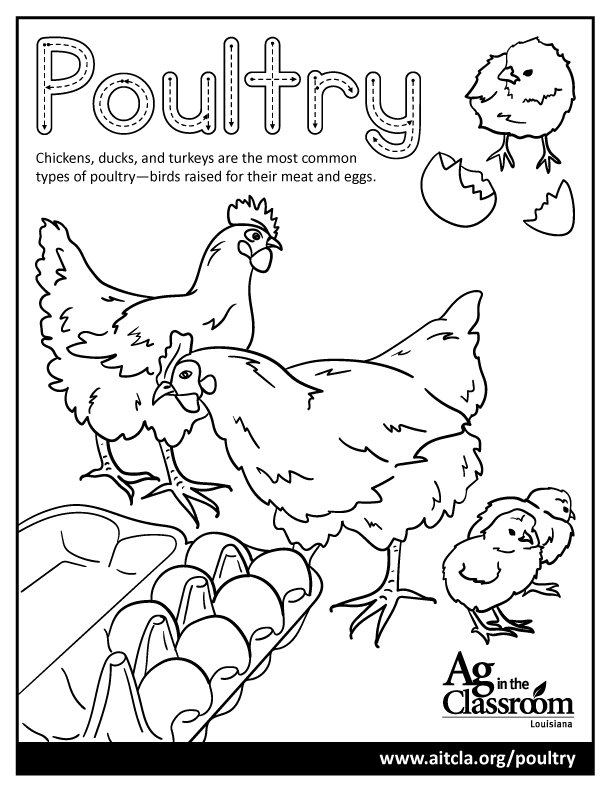Poultry
INDUSTRY
Poultry is defined as birds raised to provide meat and eggs for human consumption. Chickens, ducks and turkeys are the most common kinds of poultry.
Each person in the United States eats, on average, about 64 pounds of poultry each year. Of those 64 pounds, about 83% is chicken. The other 17% is turkey.
It’s thought the chickens common in the U.S. today were brought by Spanish explorers around the 1550s. On Columbus’ second voyage, he brought hens to supply the crew with meat and eggs on their journey, and many English settlers brought chickens with them to the New World. All were added to American flocks, and by the early 1600s, many settlers had flocks of chickens to feed their families.
Over the past 100 years, poultry production has grown from backyard flocks and small, local businesses into highly efficient family farms.
PRODUCTION
Poultry production consists of two parts: egg production and broiler production. Broiler production makes up most of the poultry industry in Louisiana and is the largest animal agricultural industry in the state.
Egg Production: Female chickens raised to produce eggs are called laying hens. They begin laying when they are about 20-22 weeks old and can produce between 260-300 eggs per year.
Eggs are gathered either by hand or machine and are used in a variety of products including ice cream, cakes, cookies and candy.
Broiler Production: Chickens raised solely for their meat are called broilers or fryers.
Broilers reach a harvest weight—approximately 4½ pounds—in about 42 days. The rapid growth of pullets, chickens that are less than a year old, is due to a controlled diet, good housing and quality stewardship by farmers.
Broilers are raised in long, low houses approximately 43 X 500 feet or larger, usually equipped with heaters, cooling misters and other amenities to keep the birds comfortable year-round. It is possible for one poultry house to hold 100,000 birds at a time.
One of the greatest values for the poultry industry is the fast food business.
NUTRITION
Chicken is an excellent source of complete protein and contains no carbohydrates. Chicken liver is a good source of vitamin A and B vitamins.
Chicken is a short-fibered meat and highly digestible. Compared to other meats, lean chicken has a lower fat content.
Eggs are an excellent source of protein and supply the body with a wide array of vitamins and minerals.
FROM FARM TO TABLE
Primary Breeders—Develop strains of poultry for best meat and efficient feed conversion.
Feed Mills—Create food for different stages of growth in poultry.
Breeders—Raise chicks to adults and produce fertile hatching eggs.
Hatchery—Hatches eggs in incubators that maintain temperature and humidity.
Grow Out Ranches—Raise newly hatched chicks to market weight.
Processing Plants—Harvest birds (USDA inspected).
Further Processing—Further processes whole chicken by breading, marinating or cooking.
Transportation & Marketing—Transports products in refrigerated trucks to stores and restaurants.
LIFE CYCLE
TERMS TO KNOW
Air Cell - the pocket of air formed at the large end of the egg between the shell membranes that increases in size with age; caused by the contraction of the contents as the egg cools after laying
Albumen - translucent content of the egg that provides the major source of riboflavin and protein; provides protein to the growing embryo and cushions the embryo during its development; protects against microbes
Beard - the black lock of hair found on a male turkey’s chest
Blastodisc - location in which an embryo will develop if the egg is fertilized; called a blastoderm once fertilized
Broiler / Fryer - a chicken bred for meat
Caruncle / Comb - the red-pink, fleshy growth on the head and upper neck of turkeys and chickens
Chalaza - cord-like, twisted strand in the albumen that anchors the yolk in the center of the egg
Chick - a baby chicken
Flock - a number of animals of one kind that keep or feed together or are herded together
Gizzard - the part of a bird’s stomach that contains tiny stones, which help them grind up food for digestion
Hen - female chicken
Incubator - a box which maintains a constant temperature; used to hatch eggs
Poult - a young turkey
Pullet - a chicken less than a year old
Rooster - a male chicken
Shell - outer covering of the egg, composed largely of calcium carbonate, that provides protection to the rest of the egg
Shell Membrane - two paper-like membranes that are protective barriers against bacteria
Snood - the long, red fleshy growth from the base of the beak that hangs down over the beak of a turkey
Tom - male turkey
Wattle - a bright red appendage at the neck of a turkey
Yolk - the yellow portion of an egg; contains the major source of vitamins and minerals in an egg; contains almost half of an egg’s protein
RECIPE
Chicken Fricasse with Dumplings
Serves 6-8
Ingredients:
1/3 cup vegetable oil
½ cup all-purpose flour
1 medium onion, chopped
1 green pepper, chopped (optional)
2 stalks celery, chopped (optional)
1 ¼ quarts water
2 to 3-pound broiler-fryer, cut up
10-ounce can biscuits
salt and pepper to taste
hot cooked rice (optional)
Directions:
In a thick cast aluminum or heavy iron pot, heat oil; add flour and stir constantly until flour-oil mixture is slightly darker than a brown grocery bag.
Remove from heat; stir in chopped onion, pepper and celery, stirring until transparent.
Return to heat and add water.
Heat to boiling; add chicken pieces, salt and pepper. Simmer for about 1 hour.
Cut canned biscuits in half; place on top of meat.
Cook, covered, for another 25 minutes. Serve over rice.
Foods à la Louisiane—a cookbook by the Louisiana Farm Bureau Women
Submitted by Marie Bordelon of Avoyelles Parish
COLORING PAGE
Select the image below to download, print and color this fact sheet. Fit-to-page printing option recommended. See more commodity coloring pages!
MAKE & TAKES
Chick Story
Thankful Turkey
What’s Inside
LESSON PLANS
Grades K-2
Be a DetEGGtive!
Eggology
Eggs: From Hen to Home
Farm Animal Life Cycles
Farm Animal Match
From Chicken Little to Chicken Big
Hatching Science with Classroom Chicks
Inside the Egg, Hatching Chicks
Grades 3-5
Eggology
Eggs in the World of Food Choices
Eggs: From Hen to Home
Eggs: Protein MVP
FoodMASTER: Eggs
FoodMASTER: Meat, Poultry and Fish
From Chicken Little to Chicken Big
Hatching Science with Classroom Chicks
Inside the Egg, Hatching Chicks
A Rafter of Turkeys
Right This Very Minute
Grades 6-8
Eggs on the Menu
FoodMASTER Middle: Eggs
Hen House Engineering
Photoperiod Phenomena
The Geography of Thanksgiving Dinner
Grades 9-12
Don’t Forget the Eggs!
The Geography of Thanksgiving Dinner
Hen House Engineering
Photoperiod Phenomena
Weighing-in on Egg Labels, Supply and Demand
VIRTUAL FIELD TRIPS
360 Riverhill Farms Tour (2:04)
360 Virtual Reality Egg Grading and Processing Tour (7:00)
Farm Food 360 Tour - Egg (6:18)
Farm Life 360 - Virginia Chicken House (0:45)
Take a 360 Virtual Reality Tour of a Chicken Farm (4:40)
USPOULTRY’s 360-Degree Virtual Reality Turkey Farm Video Tour (6:00)


